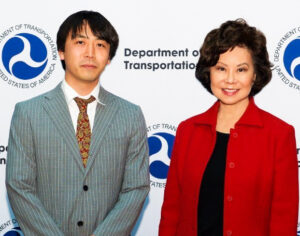This blog post was contributed by Lee Norrgard, Program Officer in Meridian’s Professional Exchanges Division
For almost 170 years, the United States and Japan have organized informational and cultural exchanges between our two countries. Arriving in 1871, Umeko Tsuda was a seven-year-old girl sent to learn Western ways in Washington, DC. Her foster parents provided schooling that led to her graduation from Bryn Mawr College. Upon returning to Japan, she founded the prestigious women’s school Tsuda University which continues the intercultural exchange first experienced by the young Umeko Tsuda.
Carrying on this long tradition, in the 1970s, the Government of Japan and the U.S. State Department’s International Visitor Leadership Program sponsored the Global Government-to-Government Partnership (G3P), which brings mid-level Japanese civil servants to serve year-long fellowships in the U.S. After an introductory orientation by the State Department, and implementing partner Meridian, most fellows spend their first months enhancing their English skills. Then, they pursue an internship at a federal or state agency, work with Meridian staff, and meet with government officials, think tanks, academics and representatives of the private sector. International exchanges like the G3P program enables Meridian to create a more interconnected world, amplifying our capacity to solve shared global challenges.
In March of 2019, four G3P fellows arrived to spend their fellowship year in the U.S.
Ms. Yoko Usuba, from the Ministry of Education, Culture, Sports, Science, and Technology arrived in Washington thinking about the young Tsuda’s exchange. Her fellowship focused on American schools supporting immigrant students. Because of its aging workforce, Japan has newly accepted foreign workers and their children. They face language and cultural barriers similar to America’s immigrant students. Working with Meridian and through a fellowship at the University of California San Diego, Yoko visited more than 30 different schools, meeting with administrators, teachers and students. She reflects, “Through international collaboration, learning from each other’s best practices, we can create educational environments [where] every child can make the most of their potential.” Now in Tokyo, Yoko’s back at her ministry and using the G3P experience to develop exchange programs and trainings for university and school administrators, teachers and students. It was her G3P fellowship that “made me realize the importance of first-hand experiences”, she added.

Mr. Kenta Takahashi is an engineer in the Ministry of Economy, Trade, and Industry focusing on industrial safety issues. His fellowship concentrated on the safe provision of electric power, pipeline safety and industrial safety standards. He served a two-month internship with the U.S. Department of Transportation’s Pipeline Hazardous Materials Safety Administration, and also met with state public utility regulators, electric transmission systems, utility workers, universities, private companies, voluntary standard-setting associations and federal agencies. His takeaway in visiting 14 states was, “I experienced the differences in climate and culture at each. I studied not only the way safety regulations match regional characteristics, but also made a comparative analysis between Japan and the U.S.” Kenta is now his ministry’s representative in Japan’s Reconstruction Agency focusing on the reconstruction and revitalization of the Fukushima Prefecture damaged in the Great East Japan Earthquake. “I’m responsible for creating new policies related to the reconstruction and revitalization from nuclear disasters.”
Mr. Takamitsu Isse has a law degree and works for the Ministry of Health, Labor, and Welfare in Actuarial Affairs and the Pension Bureau. His fellowship focused on state and local public pensions, and how they are managing pension reserves with America’s aging population. The National Association of State Retirement Administrators invited him to attend its national convention and he also visited state and municipal pension officials in five states. He had meetings with economists from the Federal Reserve and think tanks, and with academics, legislative staff and the Social Security Administration. What most impressed him was how Wisconsin’s pension system handles investments. “We Japanese can learn a lot from their success.” He returned to his ministry in the international pension department, where he is drafting rules for combining pension subscriptions from different countries and Japan for foreign workers.
Mr. Hayato Aigasa also has a law degree and works for the Ministry of Health, Labor, and Welfare, but in the Employment, Environment, and Equal Employment Bureau. His research targeted the rights of independent contractors as well as work and family-life balance. In California, he met with legislators, state agencies and the private sector to discuss AB5, the new law offering Uber and other independent contractors the same benefits as other workers. He concluded that AB5 “will be a meaningful suggestion for the Japanese Government.” In addition, his focus on work and family-life balance studied three state paid-family leave plans (California, Massachusetts and New York). Currently, Japan, like the U.S., is facing coronavirus health and economic challenges. Returning home, Hayato was put to work helping independent contractors. He is aiming to provide paid parental leave for ‘gig economy’ workers who need to suspend or stop work to care for their children and families.
















